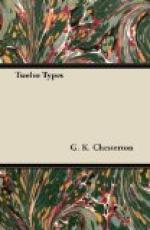It is said that Scott is neglected by modern readers; if so, the matter could be more appropriately described by saying that modern readers are neglected by Providence. The ground of this neglect, in so far as it exists, must be found, I suppose, in the general sentiment that, like the beard of Polonius, he is too long. Yet it is surely a peculiar thing that in literature alone a house should be despised because it is too large, or a host impugned because he is too generous. If romance be really a pleasure, it is difficult to understand the modern reader’s consuming desire to get it over, and if it be not a pleasure, it is difficult to understand his desire to have it at all. Mere size, it seems to me, cannot be a fault. The fault must lie in some disproportion. If some of Scott’s stories are dull and dilatory, it is not because they are giants but because they are hunchbacks or cripples. Scott was very far indeed from being a perfect writer, but I do not think that it can be shown that the large and elaborate plan on which his stories are built was by any means an imperfection. He arranged his endless prefaces and his colossal introductions just as an architect plans great gates and long approaches to a really large house. He did not share the latter-day desire to get quickly through a story. He enjoyed narrative as a sensation; he did not wish to swallow a story like a pill that it should do him good afterwards. He desired to taste it like a glass of port, that it might do him good at the time. The reader sits late at his banquets. His characters have that air of immortality which belongs to those of Dumas and Dickens. We should not be surprised to meet them in any number of sequels. Scott, in his heart of hearts, probably would have liked to write an endless story without either beginning or close.
Walter Scott is a great, and, therefore, mysterious man. He will never be understood until Romance is understood, and that will be only when Time, Man, and Eternity are understood. To say that Scott had more than any other man that ever lived a sense of the romantic seems, in these days, a slight and superficial tribute. The whole modern theory arises from one fundamental mistake—the idea that romance is in some way a plaything with life, a figment, a conventionality, a thing upon the outside. No genuine criticism of romance will ever arise until we have grasped the fact that romance lies not upon the outside of life but absolutely in the centre of it. The centre of every man’s existence is a dream. Death, disease, insanity, are merely material accidents, like toothache or a twisted ankle. That these brutal forces always besiege and often capture the citadel does not prove that they are the citadel. The boast of the realist (applying what the reviewers call his scalpel) is that he cuts into the heart of life; but he makes a very shallow incision if he only reaches as deep as habits and calamities and sins. Deeper than all these lies a man’s




